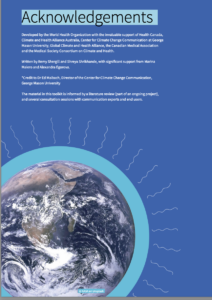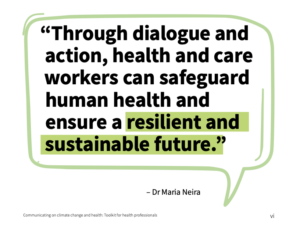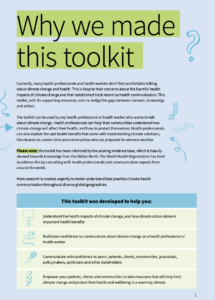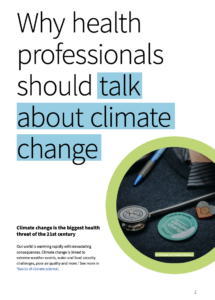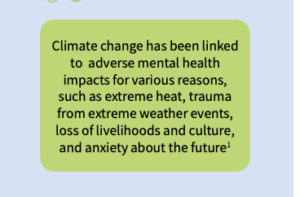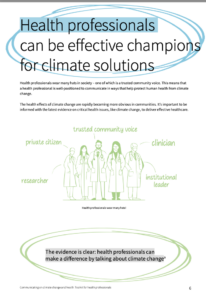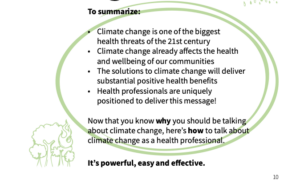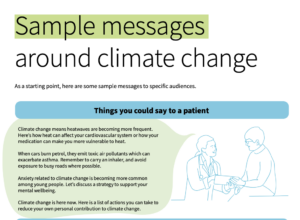WHO: Communicating on climate change & health – ‘Toolkit for health professionals’ – Suggest ‘you could say to a patient…anxiety related to climate change is becoming more common…here is a list of actions you can take to reduce your own personal contribution’
https://www.who.int/
Overview
Climate change presents one of the most significant global health challenges, already negatively affecting communities worldwide. Communicating the health risks of climate change and the health benefits of climate solutions is both necessary and helpful. To support this, the World Health Organization (WHO) in collaboration with partners is launching a new toolkit designed to equip health and care workers with the knowledge and confidence to effectively communicate about climate change and health.
The toolkit provides comprehensive resources to help health professionals understand the health impacts of climate change, as well as health co-benefits of climate action, build confidence in communication, and engage with various stakeholders effectively. By empowering health and care workers to communicate about climate change and health, it aims to drive collective action towards mitigating climate change, building resilience and safeguarding public health.
The communications toolkit was developed by WHO in collaboration with Health Canada, the Global Climate and Health Alliance, George Mason University Center for Climate Change Communication, Medical Society Consortium on Climate and Health, Climate and Health Alliance Australia, and the Canadian Medical Association.
The toolkit launch event took place online on Zoom. Recording of the event is available below.
From the report: “Things you could say to a patient”: “Anxiety related to climate change is becoming more common among young people. Let’s discuss a strategy to support your mental wellbeing. Climate change is here now. Here is a list of actions you can take to reduce your own personal contribution to climate change.”
*Credit to Dr Ed Maibach, Director of the Center for Climate Change Communication, George Mason University
[ Climate Depot note: Maibach was also a signatory of the infamous letter to President Obama urging the use of RICO statutes against climate skeptics. See: Flashback: Debate no more! Jailed for scientific dissent?! Twenty climate scientists, including Top UN scientist Dr. Kevin Trenberth, & George Mason’s Ed Maibach, call for RICO investigation of climate skeptics in letter to Obama – Via Politico: ‘Twenty climate scientists called for RICO investigation in a letter to Obama and U.S. Attorney General Loretta Lynch.” & see: Effort to turn weathermen into climate activists fraught with bad science & backed by RICO supporting professor & funded by taxpayers ]
WHO report claims: “Climate change has been linked to adverse mental health impacts for various reasons, such as extreme heat, trauma from extreme weather events, loss of livelihoods and culture, and anxiety about the future.”
…
WHO: “Health professionals wear many hats in society – one of which is a trusted community voice. This means that a health professional is well-positioned to communicate in ways that help protect human health from climate change. The health effects of climate change are rapidly becoming more obvious in communities. It’s important to be informed with the latest evidence on critical health issues, like climate change, to deliver effective healthcare. can be effective champions for climate solutions.”
…
“The evidence is clear: health professionals can make a difference by talking about climate change.” …
To summarize: Climate change is one of the biggest health threats of the 21st century •
Climate change already affects the health and wellbeing of our communities •
The solutions to climate change will deliver substantial positive health benefits
Health professionals are uniquely positioned to deliver this message!
Now that you know why you should be talking about climate change, here’s how to talk about climate change as a health professional.
It’s powerful, easy and effective.”
…
